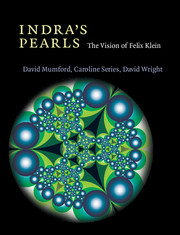Book contents
- Frontmatter
- Contents
- Preface
- Introduction
- 1 The language of symmetry
- 2 A delightful fiction
- 3 Double spirals and Möbius maps
- 4 The Schottky dance pages 96 to 107
- 4 The Schottky dance pages 107 to 120
- 5 Fractal dust and infinite words
- 6 Indra's necklace
- 7 The glowing gasket
- 8 Playing with parameters pages 224 to 244
- 8 Playing with parameters pages 245 to 267
- 9 Accidents will happen pages 268 to 291
- 9 Accidents will happen pages 291 to 296
- 9 Accidents will happen pages 296 to 309
- 10 Between the cracks pages 310 to 320
- 10 Between the cracks pages 320 to 330
- 10 Between the cracks pages 331 to 340
- 10 Between the cracks pages 340 to 345
- 10 Between the cracks pages 345 to 352
- 11 Crossing boundaries pages 353 to 365
- 11 Crossing boundaries 365 to 372
- 12 Epilogue
- Index
- Road map
8 - Playing with parameters pages 224 to 244
Published online by Cambridge University Press: 05 January 2014
- Frontmatter
- Contents
- Preface
- Introduction
- 1 The language of symmetry
- 2 A delightful fiction
- 3 Double spirals and Möbius maps
- 4 The Schottky dance pages 96 to 107
- 4 The Schottky dance pages 107 to 120
- 5 Fractal dust and infinite words
- 6 Indra's necklace
- 7 The glowing gasket
- 8 Playing with parameters pages 224 to 244
- 8 Playing with parameters pages 245 to 267
- 9 Accidents will happen pages 268 to 291
- 9 Accidents will happen pages 291 to 296
- 9 Accidents will happen pages 296 to 309
- 10 Between the cracks pages 310 to 320
- 10 Between the cracks pages 320 to 330
- 10 Between the cracks pages 331 to 340
- 10 Between the cracks pages 340 to 345
- 10 Between the cracks pages 345 to 352
- 11 Crossing boundaries pages 353 to 365
- 11 Crossing boundaries 365 to 372
- 12 Epilogue
- Index
- Road map
Summary
‘I could spin a web if I tried,’ said Wilbur, boasting. ‘I've just never tried.’
‘Let's see you do it,’ said Charlotte…
‘OK,’ replied Wilbur. ‘You coach me and I'll spin one. It must be a lot of fun to spin a web. How do I start?’
As any mathematician who has revealed his (or her) occupation to a neighbour on a plane flight has discovered, most people associate mathematics with something akin to the more agonizing forms of medieval torture. It seems indeed unlikely that mathematics would be done at all, were it not that a few people discover the play that lies at its heart. Most published mathematics appears long after the play is done, cloaked in lengthy technicalities which obscure the original fun. The book in hand is unfortunately scarcely an exception. Never mind; after a fairly detailed introduction to the art of creating tilings and fractal limit sets out of two very carefully chosen Möbius maps, we are finally set to embark on some serious mathematical play. The greatest rewards will be reaped by those who invest the time to set up their own programs and join us charting mathematical territory which is still only partially explored.
All the limit sets we have constructed thus far began from a special arrangement of four circles, the Schottky circles, grouped into two pairs. For each pair, we found a Möbius map which moved the inside of one circle to the outside of the other.
- Type
- Chapter
- Information
- Indra's PearlsThe Vision of Felix Klein, pp. 224 - 244Publisher: Cambridge University PressPrint publication year: 2002



